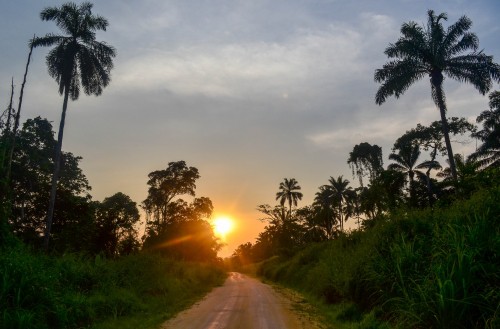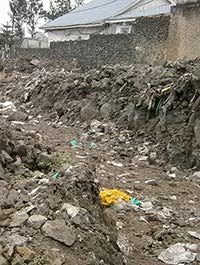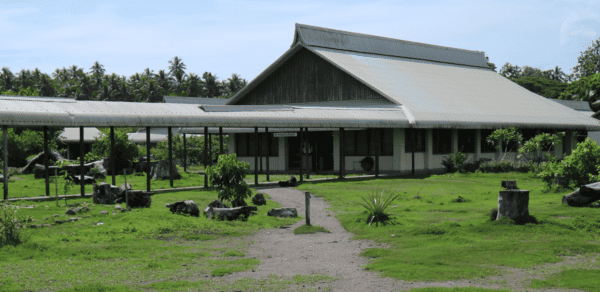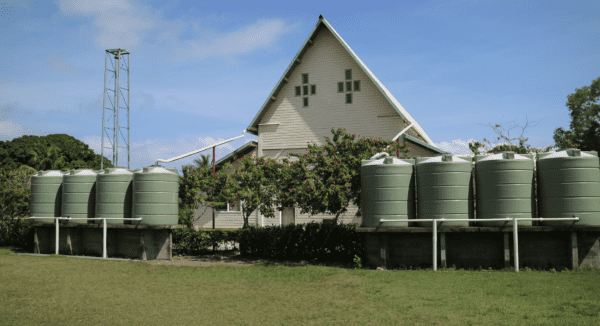Image: Road of Lekoumou province, Congo, (Photo: Jbdodane, Flikr).
“How was the Congo?”
Since I returned from two months of intensive fieldwork in the Democratic Republic of the Congo (DRC), I have tried desperately to avoid situations in which colleagues or friends might ask me that. Because I really don’t know how the Congo was.
The DRC has some of the world’s most fertile soil, but poor infrastructure and mismanagement mean that people are starving to death in IDP and demobilization camps. Yet I would be wrong, of course, to perpetuate the fatalistic image of the ‘Heart of Darkness’. During almost 200 interviews, meetings, and events, I experienced a lot of the great creativity, warmth and hospitality for which the Congolese are so well known. Many of those I spoke to saw their future as hopeful, and they were proud to be Congolese. In Goma, they even created their own cover of Pharrell Williams’ hit Happy called Happy We Are From Goma.
As one of my Congolese research associates explained, in Goma ‘the impossible is possible, but also the possible is impossible’. An aid worker I interviewed noted in her blog that the eastern Congo has a ‘unique mix of simple pleasures, random absurdities and utter surrealness’.
While contradiction and confusion seem to be everywhere in the DRC, this is not necessarily a barrier to good research. John Law has argued that social scientists should embrace the messiness of the world they are studying and adapt their research methods accordingly.
So in my research on armed groups, I tried to speak to a wide variety of actors living and working in the eastern DRC to build up a ‘patchwork’ view of competing perspectives. One of my main hypotheses is that different actors have different ontological and epistemological approaches to conflict in the DRC – and that producing better programmes requires better mutual understanding. So I was aware that fieldwork would not produce neat, objectively ‘correct’ answers to my questions.
But I was not prepared for the extent of the contradictions that emerged. Nor for the difficulties of trying to verify, triangulate or analyse some of the information I collected.
‘The Garbage Road’: A Goma road destroyed by the eruption of Mount Myiragongo in 2002, which is still being reconstructed today (Photo: Suda Perera).
In the eastern DRC the media have relatively little freedom and security, and the legal system is at best weak and at worst predatory. Sometimes the UN has failed to act to protect people (and in certain cases it has been accused of working against the interests of the Congolese).
Neither expatriates nor Congolese have good access to unbiased and verifiable information, and people tend to rely on rumours. These rumours are then given credibility by wider narratives that follow a series of plausible logics.
The shooting of Emmanuel de Merode in April this year provides a good example. The manager of Africa’s oldest national park, de Merode had acquired a number of enemies in his efforts to fight environmental degradation. But he was unable to identify his attackers, and it’s unlikely they will ever be caught. Nonetheless, plenty of my interviewees, from UN workers to armed group members, were willing to tell me their opinions of what happened. They all presented themselves as reliable because they had some special ‘insider’ knowledge from ‘knowing someone who knows’ and being ‘around’ (meaning ‘in the DRC’) at the time. But nobody had any documented or verifiable evidence.
Their explanations seemed equally plausible, and often cancelled each other out. Some reasoned that the British Oil Company, Soco, (pressured by de Merode to halt its exploration in Virungas), was most logistically capable of organizing such a coordinated attack. Others countered that if Soco had organised it, they would have done a better job and de Merode would be dead.
These frequent ‘rationalizations’ of rumours were often used to make sense of unexplained deaths, like that of Congolese war hero Colonel Mamadou Ndala. They also cast doubts on the veracity of official rulings that other popular soldiers, like North Kivu Military Commander General Lucien Bahuma Ambamba, had died of natural causes.
Researching in such circumstances made standard methods of verifying information difficult. I became lost in what I called ‘Bermuda Triangulation’.
The more people I asked, the more alternative explanations I got, and the less certain of ‘the facts’ I grew. And I rarely found evidence that dispelled a particular myth.
It is submerged in this sea of competing realities that I now sit, wondering which accounts I should believe, and what these narratives mean for understandings of armed groups.
In After Method, John Law asks: “If this is an awful mess…then would something less messy make a mess of describing it?”
Theoretically, yes. But to communicate social research on messy issues to the audiences who need to listen, at least some sense needs to be made so this ‘mess” can be presented in a useful way. Doing that when you have both messy theory and messy data can be a Sisyphean task.
Read more about Suda’s fieldwork experiences in her post on the security challenges of research in fragile situations.











